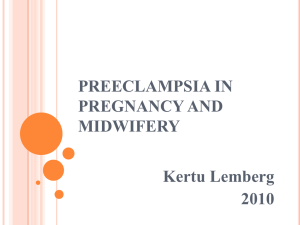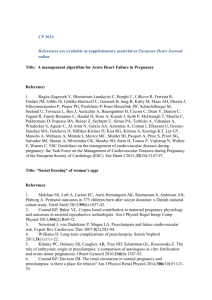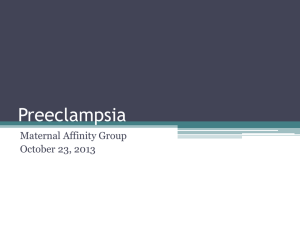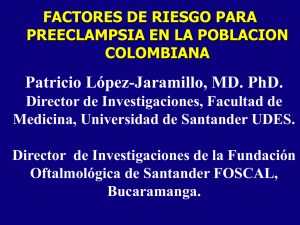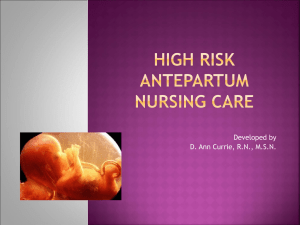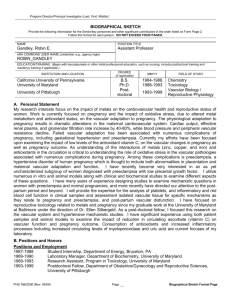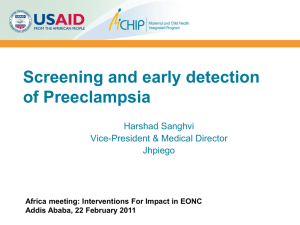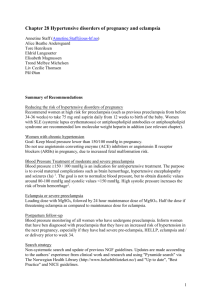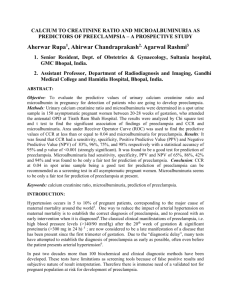Patient Information Sheet - The Oxford Safer Pregnancy Alliance
advertisement
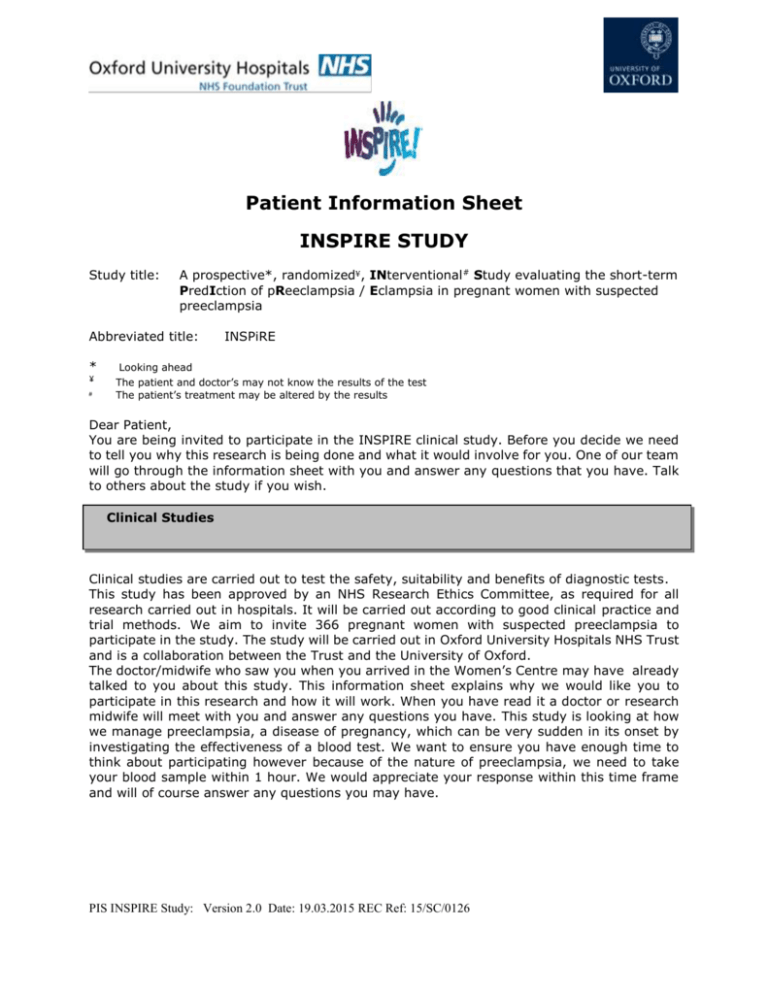
Patient Information Sheet INSPIRE STUDY Study title: A prospective*, randomized¥, INterventional# Study evaluating the short-term PredIction of pReeclampsia / Eclampsia in pregnant women with suspected preeclampsia Abbreviated title: * ¥ # INSPiRE Looking ahead The patient and doctor’s may not know the results of the test The patient’s treatment may be altered by the results Dear Patient, You are being invited to participate in the INSPIRE clinical study. Before you decide we need to tell you why this research is being done and what it would involve for you. One of our team will go through the information sheet with you and answer any questions that you have. Talk to others about the study if you wish. Clinical Studies Clinical studies are carried out to test the safety, suitability and benefits of diagnostic tests. This study has been approved by an NHS Research Ethics Committee, as required for all research carried out in hospitals. It will be carried out according to good clinical practice and trial methods. We aim to invite 366 pregnant women with suspected preeclampsia to participate in the study. The study will be carried out in Oxford University Hospitals NHS Trust and is a collaboration between the Trust and the University of Oxford. The doctor/midwife who saw you when you arrived in the Women’s Centre may have already talked to you about this study. This information sheet explains why we would like you to participate in this research and how it will work. When you have read it a doctor or research midwife will meet with you and answer any questions you have. This study is looking at how we manage preeclampsia, a disease of pregnancy, which can be very sudden in its onset by investigating the effectiveness of a blood test. We want to ensure you have enough time to think about participating however because of the nature of preeclampsia, we need to take your blood sample within 1 hour. We would appreciate your response within this time frame and will of course answer any questions you may have. PIS INSPIRE Study: Version 2.0 Date: 19.03.2015 REC Ref: 15/SC/0126 1. Purpose of the study – what is this study about Preeclampsia is a condition that only affects pregnant women. It causes high blood pressure and the presence of protein in urine. It is defined as a blood pressure above 140/90 with the presence of significant protein in the urine (>0.3g/L). It can have serious effects on the health of mother and baby. Women with preeclampsia are often monitored very closely, by multiple blood tests, inpatient admission for blood pressure monitoring and tests to make sure the baby is happy. Occasionally, if the blood pressure is very high women may have to take medications to control blood pressure. The woman may need to be delivered early if the disease becomes severe. It is therefore important to be able to determine whether a woman with suspected preeclampsia will actually develop this condition, so that her care can be increased as necessary. The substances “sFlt-1” and “PlGF”, which are being investigated in this study, are already being used in a diagnostic tests to help diagnose preeclampsia. These markers are detected in blood samples of pregnant women. If these two markers are present in a certain ratio, this is a strong possible indicator of the clinical diagnosis of preeclampsia. The diagnostic test developed by Roche Diagnostics has been available on the market in Europe since 2009 and is used routinely in several medical clinics worldwide. Recently data has shown that the test may be useful for ruling out preeclampsia in women who may have some symptoms and signs of the disease, but where the diagnosis is not clear. The purpose of this study is to investigate whether the test can be used to identify which women might get pre-eclampsia later in the pregnancy and who require more careful watching and additional treatment. It will also help us to try to identify those women who do not have a risk of preeclampsia. You are not required to take any medications as part of this study. 2. Why have I been invited to participate ? You have been invited to participate in the study because you have some signs and symptoms that might suggest that you may develop or have preeclampsia. Your participation in this study is completely voluntary. You will join the study only if you give your written consent. 3. Do I have to take part? It is up to you to decide whether or not to take part. If you do decide to participate you will be given this Patient Information Sheet to keep and you will be asked to sign a consent form. If you do not participate in the study, your continued medical treatment will not be affected. This likewise applies if you decide later that you want to withdraw your consent to participate in the study. You can withdraw your consent at any time without giving a reason; we will ask your permission to use the data and results collected up to that point. The study continues until six weeks after the birth of your baby. PIS INSPIRE Study: Version 2.0 Date: 19.03.2015 REC Ref: 15/SC/0126 4. What will happen to me if I agree to take part? Before you can be included in this study, your doctor or midwife will clarify whether you meet the criteria for inclusion in the study. We will approach you if there is a suspicion that you have or are developing preeclampsia. We will talk to you about the test and, if you are willing, we will invite you to read this information sheet and ask questions about the test. If you do take part in the study, we will take an additional blood test, which will measure sFlt1 and PlGF. The laboratory will then either reveal the result to us or not reveal the test to us. The doctors, midwifes and medical team will not know the result in the non-reveal group. Allocation to either group will be randomly assigned by the laboratory. We do this in order for us to know whether the test is useful or not, and this is a standard way of conducting this type of study. We have been careful to design the study in a way that all patients will receive our best current standard of care. If you are in the non-reveal group, you will receive our best standard care, including follow up and visits to your GP, community midwife or the hospital as well as an additional follow up one week later. We would look at your complete clinical picture to determine your care (standard practice). If you are in the reveal group, you will receive our best standard care including follow up and visits to your GP, community midwife or the hospital as well as an additional follow up one week later. We would use to the information from the test result as an aid to your complete clinical picture to determine your care (as an aid to standard practice). For both reveal and non-reveal groups, we would take routine measurements such as measuring blood pressure and testing urine for protein and take blood for standard tests including a full blood count, urea & electrolytes and liver function tests at each visit. If pregnancy complications should occur, we would ask for additional blood and urine samples, which would be part of your routine care. In addition we would like to take two additional samples of blood today and in one week of 4 ml (less that a teaspoon) in order to determine the preeclampsia markers sFlt-1 and PIGF. In addition, we will collect data about your pregnancy and the birth for another 6 weeks after your baby is born. We would like to see you again one week after you agree to participate in the study and with your permission contact you by telephone 6 weeks after your baby is born. The Flow Chart below explains the study: Meets Inclusion Criteria Consent and Test Performed Randomized TEST RESULT REVEALED TEST RESULT NOT REVEALED -VE (<38 CUT-OFF) Manage complete clinical LOW RATIO picture. Routine Clinical Care Manage complete clinical & Assessment based on picture. Routine Clinical Care & current clinical practice. Assessment based on current Decision to send home or clinical practice. Decision to PIS INSPIRE Study: Version 2.0 Date: 19.03.2015 Ref: 15/SC/0126 increase surveillance on send homeRECor increase current clinical standards surveillance on current clinical standards. Use low ratio to consider decreased surveillance +VE (≥ 38 CUT-OFF) HIGH RATIO Manage complete clinical picture. Routine Clinical Care & Assessment based on current clinical practice. Decision to send home or increase surveillance on current clinical standards. Use high ratio to consider increased surveillance The study will be carried out in the Women’s Centre, John Radcliffe Hospital, Headington, Oxford, OX3 9DU 5. What will happen to the samples I give? The substances sFlt-1 and PlGF will be measured in the samples of all the study participants. Only the laboratory staff will know the results of the reveal and the non-reveal group. The clinical team looking after you will only know the results of the reveal group. sFlt-1 and PIGF are released from the placenta into your blood and the amounts of each can alter in preeclampsia. We want to know if knowing the amounts of each can help us to identify who to monitor more closely over the following seven days. The results of these blood tests will be available in one hour. We will only take 4mls of blood which is less than a teaspoon and this blood test will be taken at the same time as we are taking your routine clinical bloods. After the bloods have been analysed, the results will be randomized to “reveal” or “non-reveal”. The clinical team will have access to the results in the “reveal” group. This means that everyone would know the result in the reveal group and no one would know the result in the non-reveal group. Patients in both groups will receive our best care according to NICE guidelines. These samples would be taken in addition to the routine bloods/urine tests, which we take as part of normal clinical care. The blood samples will be stored in a central sample bank. Your samples will be anonymised and will only be used for scientific purposes to study “pregnancy related disorders and outcomes”. The samples may eventually be sent to selected testing laboratories, where they would be investigated for new diagnostic tests. The sole purpose of these additional investigations would be to evaluate newly developed tests for use in laboratory diagnostics in the field of “pregnancy related disorders and outcomes”. No cells or genetic material will be kept from these samples. You can withdraw from the study at any time and request that your samples be destroyed. 6. Who approved the study? The study has been reviewed and given approval by an NHS Research Ethics Committee (REC). The REC looks after the rights, well-being and dignity of patients. The REC reference number is given on the front page of this information sheet. The NHS REC that reviewed the study is…… PIS INSPIRE Study: Version 2.0 Date: 19.03.2015 REC Ref: 15/SC/0126 7. Personal benefit and costs You may not receive any immediate personal benefit to your health by participating in this study. However, the results of the study may help to improve the diagnosis and ability to manage preeclampsia for other women in the future. Your participation in this study is at no expense to you or the NHS. You will not be reimbursed for taking part in this study, nor are we able to reimburse you for your travel expenses. 8. What are the possible disadvantages and risks of taking part? You should incur no risks by participating in the study, except for the usual risks associated with providing a blood sample. Only approved blood collection systems with the CE mark shall be used to collect blood. In very rare cases, taking a blood sample can result in complications such as secondary bleeding, coagulation, blue spots (bleeding under the skin), nerve damage, inadvertent arterial damage and/or infection. The quantity of blood we will collect is so small, less than a teaspoon and therefore there is no risk that you will develop anaemia. Even if you were not in this study, we would need to take blood for our routine tests. We will follow up all patients and therefore we would expect no risks to your pregnancy. 9. Involuntary termination of your participation in the study The research team or the study sponsor can discontinue your participation in the study. Reasons for this is that the study is discontinued or if your pregnancy changes in a way that alters your eligibility for the study If the study is terminated, your continued medical care will not be affected. 10. Will my GP be informed? Yes with your permission your GP will receive a letter from the study team confirming that you are participating in this study. He/she will be informed of the results of medical tests performed as part your routine care, which are important for ongoing health care. 11. Will My taking part in this study be kept confidential? PIS INSPIRE Study: Version 2.0 Date: 19.03.2015 REC Ref: 15/SC/0126 Yes all information about you will be handled in confidence. We will collect personal data from you, and it will be managed by the research team at the study site. The personal data is always anonymised therefore you cannot be identified. This means that numerical codes are used, without mentioning your name or other personal data that could be used to identify you, such as your initials or your address. The personal data can be accessed only by technical experts and members of the research team for purposes of scientific evaluation. Responsible members of the University of Oxford and the host NHS Trust may be given access to data for monitoring and/or audit of the study to ensure we are complying with regulations. It is ensured that the utmost confidentiality will be maintained throughout the entire study and if the above-noted inspections take place. Your name will not appear in any reports or publications that result from this study. The study data is protected against unauthorised access. With your permission we will extract information from your medical notes to allow us to investigate changes in your blood pressure during your pregnancy. Anonymised data collected during the course of the study may be passed on to other organisations which may include commercial organisations. 12. What will happen to the results of the study? The results of the study will be published and they will also be available on the OSPREA (Oxford Safer Pregnancy Alliance) website www.osprea.ox.ac.uk 13. Who is organising and funding the research? This study is sponsored by the University of Oxford and is a collaboration between the Oxford University Hospitals NHS Trust and the University of Oxford. The study has been funded by Roche Diagnostics but they have no part in the conduct of the study. 14. Is there a contact point where I can seek independent information about taking part in research? The hospital PALS Office (Patient Advice and Liaison Service) can be contacted for independent advice. Their website is www.pals.nhs.uk. The PALS office at the John Radcliffe Hospital site can be contacted on 01865 741166. Alternatively you can get information about public involvement in research studies from the patient organization – INVOLVE. Their website address is www.invo.org.uk 15. What if there is a problem? PIS INSPIRE Study: Version 2.0 Date: 19.03.2015 REC Ref: 15/SC/0126 The University of Oxford, as Sponsor, has appropriate insurance in place in the unlikely event that you suffer any harm as a direct consequence of your participation in this study. NHS indemnity operates in respect of the clinical treatment with which you are provided. If you wish to complain about any aspect of the way in which you have been approached or treated during the course of this study, you should contact Dr Manu Vatish, Chief Investigator on 01865 221009, email manu.vatish@obs-gyn.ox.ac.uk or you may contact the University of Oxford Clinical Trials and Research Governance (CTRG) office on 01865 572224 or the head of CTRG, email ctrg@admin.ox.ac.uk. 16. New findings The research team will notify you of any new findings that can affect the operation or safety of the study, and that could therefore affect your willingness to participate in the study. You will be provided with this information in writing. 17. Any other questions? If you have any questions, or if an emergency should occur or unexpected or unwanted events occur during the study, do not hesitate to contact the following individual: Chief Investigator: Dr Manu Vatish, Consultant Obstetrician/ Senior Research Fellow in Obstetrics, Women’s Centre, John Radcliffe Hospital, Headington, Oxford OX3 9DU. Telephone number: 01865 221009 or email: manu.vatish@obs-gyn.ox.ac.uk Thank you for taking the time to ready this information sheet. PIS INSPIRE Study: Version 2.0 Date: 19.03.2015 REC Ref: 15/SC/0126
